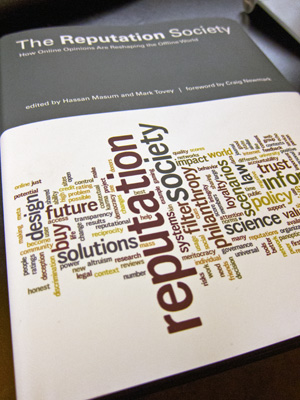Scenarios of Ill Repute

A new volume on the evolving role of digital reputation, The Reputation Society: How Online Opinions Are Reshaping the Offline World
is now out (also in Kindle format)
. Edited by my former Worldchanging colleague Hassan Masum (along with his colleague at the University of Waterloo, Mark Tovey), The Reputation Society includes essays by a wide array of writers, including Craig Newmark, Cory Doctorow, Alex Steffen, and me. My contribution, the cleverly-titled "The Future of Reputation Networks," is a set of scenarios of how online reputation systems might evolve over the next 10-20 years.
I use a classic two-dynamic scenario structure (whether the reputation networks are broad or narrow, and whether the reputation scores are directly assigned by users or "emergent"), resulting in four fairly different worlds.
In the extended entry you'll find one of the four scenarios, "Augmented Relationships."
Hiroko hated getting to the airport early, but her hosts had arranged for the taxi, and traffic was amazingly light. She stepped briskly around an older couple trying to figure out how to use the biometric check-in—“just walk through at a normal pace, guys”—and got in line for security. The airport security staff all wore augmented reality glasses that would identify people in line and pull up relevant data, monitor for microchanges to their facial expressions, and even run security cam searches to track their recent movements.
There were signs everywhere demanding that all augmented reality (AR) glasses, smartpads, and cameraphones be shut off. (People still use cameraphones? Yeah, probably that couple still stuck at check-in.) Nice. They get to see everything about us, but we don’t get to see anything about them. How’s that “transparent society” working out for you?
Hiroko amused herself while she waited by thinking about the supposedly ultrasecure, classified software the Transportation Security Administration AR systems ran. Cracked and available for download within a day. It was a nice bit of kit, though, even if not quite legal for her to use. Fortunately, the smartpad that still had the system loaded was at home.
She sailed through security, of course (although was startled, as she was putting her shoes back on, to see all of the TSA workers suddenly lift their heads and turn to look at the same guy—he must have tripped some rep flag, but whatever it was wasn’t enough for him to be stopped).
Getting to her gate reminded Hiroko of the one advantage of early arrival: she could grab one of the open power plugs. Turning her AR specs back on, she gazed idly at the other passengers slowly filtering in, and waited for the market sim to load on her pad. Everyone had the same pre-jet-lagged look, even—hey!—that old couple. Guess they figured out how to check in.
She avoided staring, of course. If she looked for too long at someone’s face, the specs would try to identify who it was, whether you had any connection to him or her, and then work out how you should feel about that person based on how other people in your social network respond to him or her. Sometimes useful, but also a bit rude—like you were looking for the right way to try to flirt. As a result, she didn’t have anything more than the basic reputation watch app on her specs—frankly, she thought, the super-detailed rep systems were something for aging Gen Y’ers, training wheels for the no longer digitally hip.
The guy sitting down a couple of rows away caught her eye. He looked familiar, but she couldn’t place him. Okay, just this once, she thought, and held her gaze. He looked up, and seemed to have a similar don’t-I-know-her reaction. After a second, a light ring popped up around his face, along with his name (Michael Ahmadi) and the connection.
He used to date her sister. Her sister had told her all sorts of things about their relationship. Very, very detailed things. Too-much-information kind of things. As if on cue, the ring Hiroko’s AR system displayed around Michael’s face started pulsing bright red—“he’s a hot one.”
Hiroko’s face went just as red and she quickly looked down, just as Michael’s augmented reality system identified her. In an instant, he saw who she was, saw the connection, and guessed why she was blushing.
He started blushing, too, and quickly looked away.
Hiroko sighed quietly. This was going to be a long flight.





